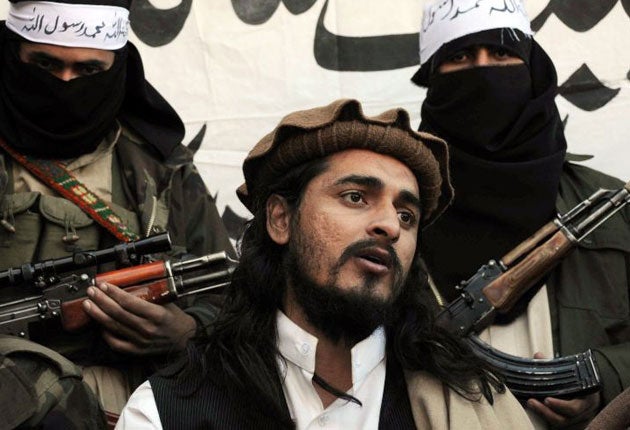US strikes back with drone attack on leader of Taliban
But Pakistan chief linked to CIA suicide bomber is still alive, claim militants

The Pakistan Taliban has denied reports that one of its leaders – a man who was recently linked to the suicide bomber who killed seven CIA operatives inside Afghanistan – had been killed by a US missile strike.
Officials in Pakistan were last night investigating reports that Hakimullah Mehsud, who last year inherited the leadership of the Tehrik-e-Taliban Pakistan (TTP), had been among at least 10 "suspected militants" killed in the drone strike in North Waziristan.
But Taliban spokesman Azam Tariq denied the reports of the leader's death. "He is safe. He is safe. These are just rumours," he told Reuters. "He was not there when the attack took place."
While analysts believe the death of Hakimullah would only deliver a temporary blow to the militants he leads, it would mark a considerable morale boost for the US and the Pakistani military, currently engaged in a major operation against the Taliban in neighbouring South Waziristan.
The strike also underlines the growing significance that the US attaches to North Waziristan, a wild, mountainous region on the border with Afghanistan that has long been a haven for militants, some of which may have been involved in the attack on the CIA operatives in eastern Afghanistan by a Jordanian double agent, Humam Khalil Abu Mulal al-Balawi.
Ten days after the suicide attack that killed the agents working out of Forward Operating Base Chapman in Afghanistan's Khost Province – the second deadliest attack in the agency's history – a video was broadcast by a Pakistani TV news channel showing Hakimullah nursing a weapon and sitting next to Balawi as he called for attacks on the US in revenge for the drone attack last summer which killed Hakimullah's predecessor, Baitullah Mehsud.
The video, which received widespread coverage, suggested that the TTP – better known for attacks inside Pakistan rather than cross-border raids on Western targets inside Afghanistan – may have provided at least some logistical support to the bomber.
The US intelligence community has also been investigating whether last month's attack may have been linked to the Haqqani network, the group of militants closely linked to the Taliban and headed by Jalaluddin Haqqani, a veteran of the CIA-backed war against Soviet forces in Afghanistan.
The group, which operates out of both North Waziristan and Afghanistan's Paktia province, is considered the architect of many cross-border attacks. But despite all the US pressure on Pakistan to target the Haqqanis, Islamabad remains slow to do so. Analysts say this is because of a belief among some elements of the ISI intelligence agency that the militants could provide leverage and influence inside Afghanistan once American troops leave.
Yesterday's attack, on a compound in the Pasalkot area of North Waziristan, is just the latest of a slew of US missile strikes in Pakistan's tribal areas, a deeply controversial tactic that has markedly increased under the administration of President Barack Obama. All seven strikes that have been carried out in 2010 have targeted North Waziristan.
"Local people are saying he was there at the time," a senior Pakistani security official told reporters. "We don't know if he was hit or not, if he's dead or alive."
This is not the first time reports have suggested that Hakimullah Mehsud has been killed, but his whereabouts have been unclear since mid-October when the Pakistani military launched an operation to drive out militants blamed for the attacks across Pakistan from South Waziristan. Many experts believe he fled to North Waziristan.
Imtiaz Gul, a writer and analyst, said: "The Americans believe the Haqqanis are at the centre of attacks on Nato troops in Afghanistan and they believe he is operating out of North Waziristan, though his men are probably moving between the two. But the Pakistani security forces do not want to attack him. They say 'If he is not harming us, if he is not attacking Pakistan, then why should we go to war with him?'"
Balawi, the man who carried out the suicide attack on the CIA, persuaded Jordanian intelligence more than a year ago that, despite continuing his work as a prolific jihadist blogger, he had become a sincere opponent of al-Qa'ida – which is why he was not searched for explosives when he entered the CIA base.
Subscribe to Independent Premium to bookmark this article
Want to bookmark your favourite articles and stories to read or reference later? Start your Independent Premium subscription today.

Join our commenting forum
Join thought-provoking conversations, follow other Independent readers and see their replies